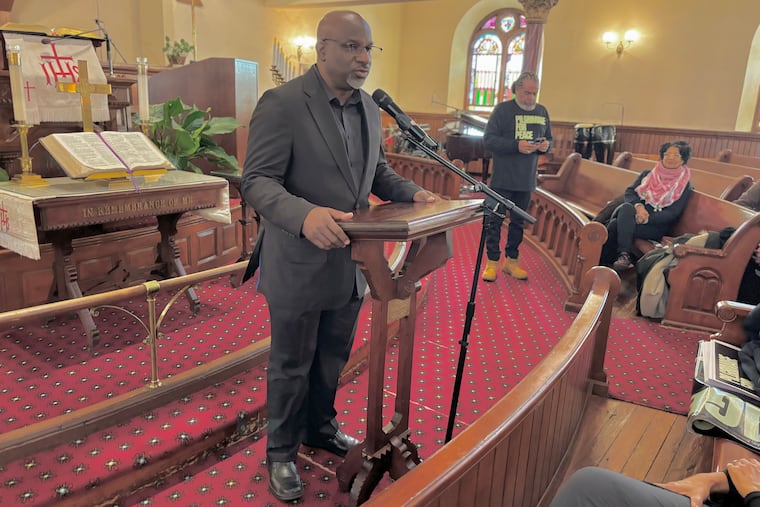The Rev. Mark Kelly Tyler wins election as an officer of the AME Church, may be replaced this year as pastor of Mother Bethel in Philadelphia
The Rev. Mark Kelly Tyler, pastor of Philadelphia's historic Mother Bethel AME Church was elected Monday as a general officer of the AME, or African Methodist Episcopal Church denomination.

The Rev. Mark Kelly Tyler, pastor of Mother Bethel AME Church in Society Hill, was elected as an officer of the African Methodist Episcopal Church (AMEC) at its General Conference this week in Columbus, Ohio.
He was elected to become one of nine general officers: executive director of the Department of Research and Scholarship and historiographer of the AME Church, which has its headquarters in Nashville.
The election took place on Monday. The Tennessee Tribune posted the results, noting that six new bishops and nine general officers were elected. (There are at least 20 bishops in charge of geographical districts.)
“As I step into the role of historiographer / executive director of the Department of Research & Scholarship of the global AME Church, I find this moment to be bittersweet,” Tyler wrote in a text from Ohio Wednesday afternoon.
“After 16 years of serving as pastor of Mother Bethel AME Church in Philadelphia, I will deeply miss the faithful members who have been such an integral part of my journey. The lessons learned and the bonds formed at Mother Bethel have not only enriched my ministry but have also prepared me for this new chapter.
“While I am excited to focus on the global history of our church and amplify its story, I will always carry the spirit of Mother Bethel with me and look forward to staying in touch with the community that has meant so much to me.”
In an interview earlier this month, Tyler said the new position would require him to resign as pastor at Mother Bethel AME, at 419 S. Sixth St., where he was appointed the church’s 52nd pastor in 2008.
He said he would remain at Mother Bethel for at least two to three months until a new pastor is appointed by the church leadership.
In his new role, he will have two offices, one in Philadelphia and one in Nashville.
» READ MORE: The Rev. Mark Kelly Tyler, of Philly’s Mother Bethel AME church, is running for election in the AME Church
“I am filled with a profound sense of excitement and purpose,” Tyler said. “This position offers a unique opportunity to delve deeper into the rich history of our beloved church, uncovering stories and insights that continue to shape our faith and mission today.”
Tyler said he has always loved history, and he hopes to create a major documentary film about the church, possibly with PBS.
The minister has already produced five documentary films through the AME Church, but he said he hoped to produce historical, documentary films for a larger audience.
A denomination on five continents
Margaret Jerrido, the archivist at Mother Bethel, said Tyler’s new position means he will be responsible for the historical records of the AME denomination all over the world.
“We are on five continents and in 40 countries,” she said.
Philadelphia’s Mother Bethel is the oldest African Methodist Episcopal church and as such is the “mother church” of the denomination.
It was founded in 1794 by Bishop Richard Allen after Allen and fellow minister, Rev. Absalom Jones, led a walkout from the predominantly whiteSt. George Methodist Episcopal Church, now known as Historic St. George’s United Methodist Church, to protest segregated worship in 1792.
Allen and Jones, who had earlier founded the Free African Society in 1787, had already discussed the need to form their own churches. The walkout from St. George’s bolstered their efforts.
Allen purchased the land for Mother Bethel in 1791, and Jones established the African Episcopal Church of St. Thomas in 1792 and became the first African American ordained priest. The current Mother Bethel church, a three-story mason building with Romanesque styling, was completed in 1890; it was named a National Historic Landmark in 1974.
The first members worshipped in an old blacksmith shop. That was replaced by frame structures in 1805 and 1841. The 1841 building, demolished for the current building, reportedly had a tunnel to a nearby Quaker meeting house to support Black people escaping from enslavement.